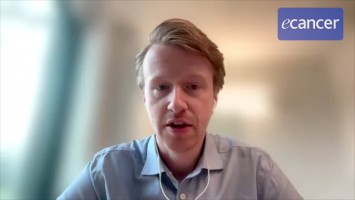I chaired one of the sessions just now, basically what can we learn from the work in haematological cancers. It was a very interesting session.
What can we learn from haematological oncology?
For a number of reasons, of course, these cancers have been researched very intensively for a number of years. The accessibility of the tumour cells and the tumour stem cells, if you wish, plays a role in that there is an advance in the timing that these molecular studies have been done. So obviously there is a longer standing experience in haematological cancers as to understanding some of the genetic aberrations and changes that lead to the development of these cancers. Bob Löwenberg gave a very nice key note lecture summarising some of that experience and basically all of the speakers in the session tried to summarise what has been learned in haematological cancers, what is currently being done in these cancers in terms of how can this experience possibly relate to solid organ oncology.
How do you think this can apply to solid tumours?
A lot of the technologies that have been applied in one are also now being applied in the other. There is the possibility now, through high-throughput sequencing, to arrive at the genetic makeup of also the solid tumours. There is a lot more clonality research, there are also similarities, even some of the genetic aberrations are one and the same in different diseases. There was a discussion about the IDH1 mutation in leukaemias and brain cancers, for example. Some of the other things do not apply as much for right now at least and more recent developments on using the immune system and using checkpoint inhibitors to treat solid cancers is obviously not something that we have seen in the haematological field very much. It doesn’t mean that it’s not going to happen but there are clear differences there, of course, also.
What were the highlights of the session you chaired?
Basically the whole scenario from the genetic aberrations to the epigenetic changes to ways of applying systems biology or more general testing, functional testing, resistance testing, in high-throughput modalities to the treatment of haematological cancers. Also some of the difficulties in treating especially diseases in the elderly and the limited successes that have had in the past and where the most recent developments are in this area.
Will you be taking any of the new information to heart in the clinic?
Obviously we have learned things, say, in the recent years or recent months, say, for example, about the IDH1 mutation that is currently going into clinical trials. So this is not practice changing just yet but obviously there are a number of drugs and interventions talked about that apply both to the haematological field and also to the solid organ oncology.
What is the IDH1 mutation?
It’s a mutation of a gene that encodes for an enzyme that has, in its mutated form, a very strong influence on epigenetic modification of DNA. It induces a hypermethylated state and thereby affects potentially many genes and their regulation. So obviously it’s one of the key mutations in the diseases where it occurs and it will be very interesting to see whether it can actually be antagonised effectively.
What are you currently researching?
I’m heading a comprehensive cancer centre so one of the areas that we’re also very closely looking at right now is high-throughput sequencing and the application of genetic findings to the clinical scenario. Another area that we’re also very interested in is obviously the cancer interaction with the immune system, the question as to whether there is pre-formed immunity against cancers in patients and how we can address this issue with regards to both unleashing the immune system or, if an immune response is absent, inducing one if possible.
What would be your take-home message?
It is always very interesting to come here because they’re really the top notch scientists and clinical researchers in each of these areas so it’s a very neat summary of the current state of the art. And because it’s not too big a meeting there’s also a very intense one on one discussion possible on some of these issues. So it’s a great meeting that I always look forward to. The other very interesting thing is, of course, that there are collaborative clinical trials that we are also participating in that are addressing one of the cutting edge challenges, namely in combination therapy and high-throughput diagnostics.
Also there is a very interesting discussion on liquid biopsy, either possibilities of new genomic and proteomics technologies to perhaps access tumour tissues in ways that we haven’t been capable of in the past which is obviously something again that has been more the case in haematological cancers earlier that naturally tend to occur in the blood, at least in some form. We are very much looking forward to the possibilities to introduce that in treating and also in preventing cancer in the future.








